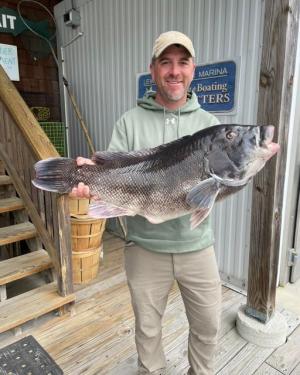Delaware, Maryland and Virginia have new fishing regulations for 2022. These will cover black sea bass, scup (porgies) and summer flounder.
We have covered black sea bass before in this column. Due to some very bad data, the powers that be have increased the minimum size to 13 inches and shortened the season by 20 days. The season will still begin this Sunday, May 15, and will end Sunday, Dec. 11, instead of Dec. 31. This in spite of the fact that the spawning stock biomass is two-and-a-half times the level needed to maintain the stock.
Summer flounder, on the other hand, will see a decrease in the minimum size from 16.5 inches to 16 inches. This in spite of some questionable spawning results. The possession limit will remain at four fish.
Finally, we have scup, known in this area as porgies. Delaware has raised the minimum size to 9 inches from 8 inches while keeping the possession limit at 50 fish per day. Now comes the interesting part – the federal government has closed scup fishing in federal waters that run out from three to 200 miles. Since most scup are caught in federal waters, it will be interesting to see how enforcement handles this situation.
To remain within the law, you must throw back any porgies you catch outside the three-mile limit. Or, you can put them in the cooler and take a chance you won’t be boarded by the Coast Guard on your way back home. This is sort of a reverse of the striped bass regulations. We know the enforcement officers were pretty diligent when it came to the striped bass regulations. I know I would not take a chance with a box full of porgies.
Bluefin tuna
Bluefin tuna are one of the most valuable fish in the sea, and because of that, they are tightly regulated in the U.S. Unfortunately, this is not the case in every country that catches these fish, which is why we have to restrict our catch.
This year, the powers that be, NOAA, have relaxed the bluefin tuna regulations and our recreational fishermen will be the beneficiaries.
These regulations went into effect May 6 and will continue until Saturday, Dec. 31, unless modified by later action.
Private boats with a highly migratory species angling category permit are allowed two school bluefin tuna between 27 and 47 inches and one large school/small medium between 47 and 73 inches.
Charter boats with an HMS charter/head boat permit fishing recreationally are now allowed three school and one large school/small medium bluefin tuna.
Head boats with an HMS charter/head boat permit when fishing recreationally are now allowed six school and two large school/small medium bluefin tuna.
If you are new to fishing for tuna, or any highly migratory species, you must have a permit for your boat. You can apply online. The cost is $26 and the wait time for processing your application is one or two weeks. Just go to NOAA HMS permits.
Fishing report
No one has been fishing since late last week. The nor’easter that arrived Friday and was still around Tuesday saw to that. It brought high winds and seas that caused flooding, beach erosion and made any thought of fishing nothing more than a pipe dream.
Just before the storm, Capt. Brent Weist on the charter boat Katydid caught a 22.7-pound tog that is currently the pending Delaware state record for that species. If verified by the state, it will replace a 21-pound, 4-ounce tog caught in 2005 by Glenn Cave.
Tog fishing was pretty good over ocean structure as both private and charter boats made limit catches using green crab and sand fleas. The Outer Wall also gave up tog, but limits were harder to come by. The rocks at Indian River Inlet were covered with tog, but keepers were rare.
A few keeper rockfish were caught from the inlet and surf. Clams and plugs worked in the surf, while plugs were the top attractor in the inlet. I gave the inlet a shot Thursday night, casting a black Bomber with a black teaser. The current didn’t run until late and by then I was chilled to the bone.
Sunday will see the opening of black sea bass season. Good luck to all those who venture out.
Correction: In last week’s article, I made a very serious mistake. I called Lydia Schmierer Linda. To add to my embarrassment, this is the second time I have done this. I am sure Lydia thinks I am the biggest idiot around, and she may be correct. I do humbly apologize for my stupid error and promise not to make the same mistake for a third time.





















































